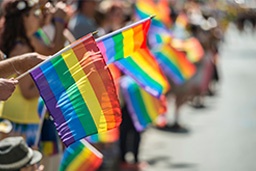The U.S. Supreme Court has delivered great news to the LGBTQ community nationwide. In this week’s landmark decision captioned Bostock v. Clayton County, the high court ruled that federal law—namely, Title VII of the Civil Rights Act of 1964—prohibits employment discrimination against LGBTQ workers. To that point, Justice Neil Gorsuch, writing for the 6-3 majority, stated, “An employer who fires an individual merely for being gay or transgender violates [the law].”
In his opinion, Justice Gorsuch went to great lengths to establish that the text of Title VII—its words alone—bars employment discrimination on the basis of sexual orientation or gender identity. The following passage cuts to the chase:
“In Title VII, Congress outlawed discrimination in the workplace on the basis of race, color, religion, sex, or national origin. Today, we must decide whether an employer can fire someone simply for being homosexual or transgender. The answer is clear. An employer who fires an individual for being homosexual or transgender fires that person for traits or actions it would not have questioned in members of a different sex. Sex plays a necessary and undisguisable role in the decision, exactly what Title VII forbids.”
In fact, the majority agreed that, “It is impossible to discriminate against a person for being homosexual or transgender without discriminating against that individual based on sex.”
By way of example, Justice Gorsuch considered a hypothetical involving an employer having two employees, both of whom were attracted to men. These workers were identical in all respects, other than the fact that one was male and his colleague was female. With that as his premise, Justice Gorsuch explained that if the employer terminated the man simply because he was attracted to other men, the employer would, by definition, be discriminating against the male employee for traits or actions it otherwise tolerated in the female worker. Stated another way, if the employer were to allow female employees to be attracted to men but deny that same right to male counterparts, it would be engaging in sex discrimination by treating men and women differently.
A Somewhat Surprising Outcome
Given the Supreme Court’s conservative makeup, the decision in Bostock may be surprising to some; indeed, Justices Samuel Alito, Brett Kavanaugh, and Clarence Thomas fervently dissented. Nevertheless, Justice Gorsuch (a Trump appointee), joined by Chief Justice John G. Roberts Jr. and Justices Ruth Bader Ginsburg, Stephen G. Breyer, Sonia Sotomayor and Elena Kagan, issued a major victory for LGBTQ rights. Now, the federal law forbidding workplace discrimination on the basis of sexual orientation or gender identity is more aligned with the laws of more liberal states, like California.
That being said, it is important not to overstate the reach and meaning of the opinion in Bostock. Justice Gorsuch confirmed that the decision is to be read narrowly, and in terms of workplace rights, he wrote, “We do not purport to address bathrooms, locker rooms or anything else of the kind . . . Whether other policies and practices might or might not qualify as unlawful discrimination or find justifications under other provisions of Title VII are questions for future cases . . ..”
In addition, it is unclear whether Bostock will entirely ban workplace discrimination on the basis of sexual orientation or gender identity. The reason: the Supreme Court is considering whether employers with religious objections to LGBTQ people should be exempt from anti-discrimination laws.
Be that as it may, gay, bisexual, and transgender individuals have good reason to celebrate, as the Bostock case extends workplace protections to millions of people across the nation. For their part, employers must be mindful of the Supreme Court’s ruling when making personnel decisions.
This blog post is not offered, and should not be relied on, as legal advice. You should consult an attorney for advice in specific situations.

